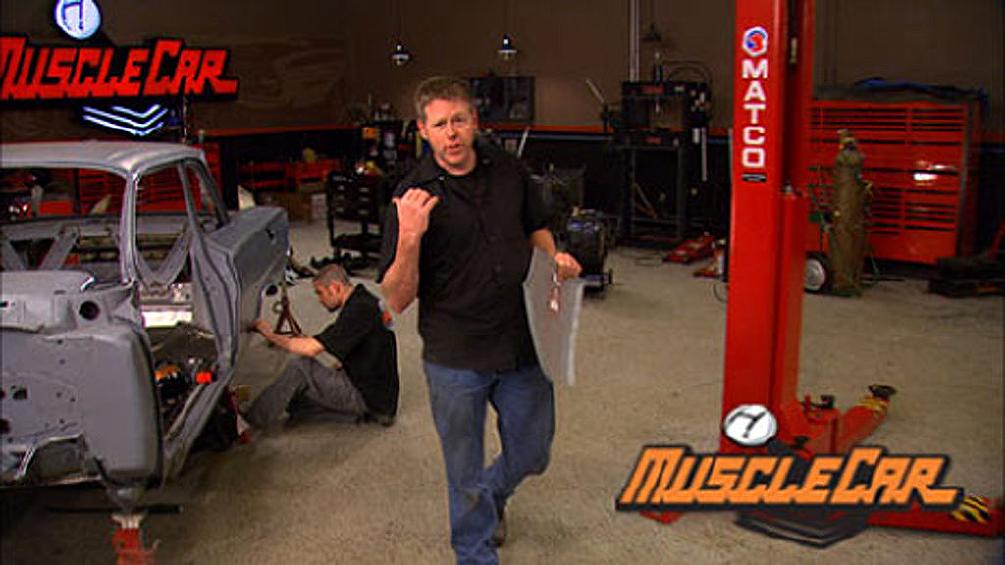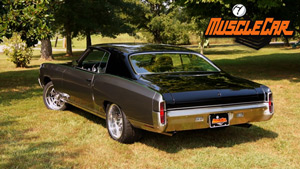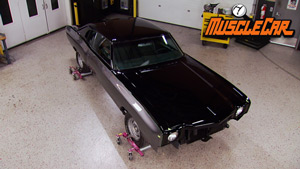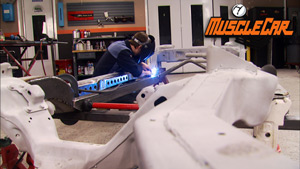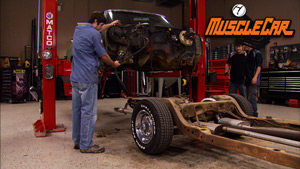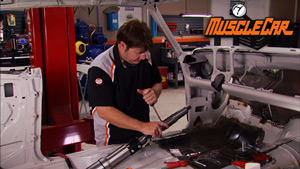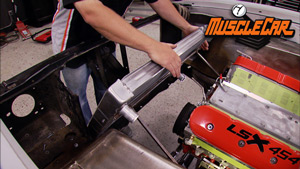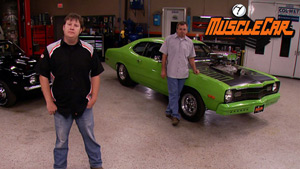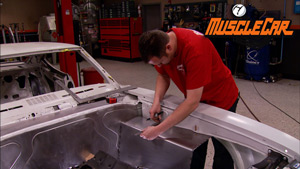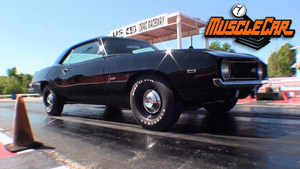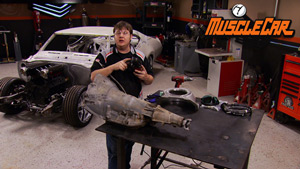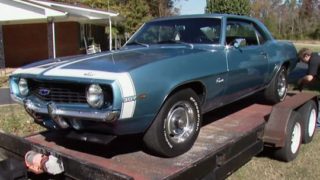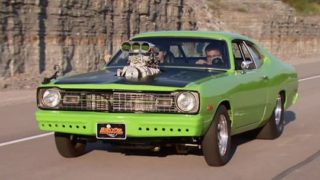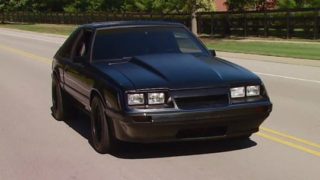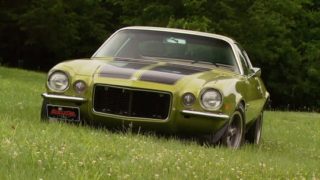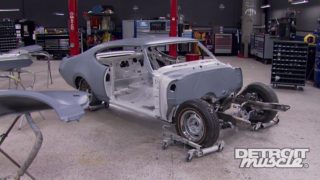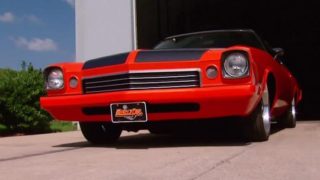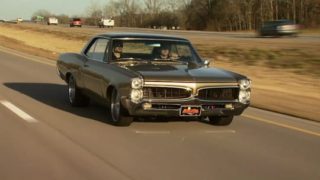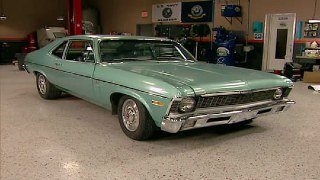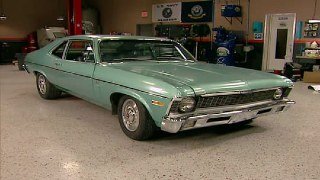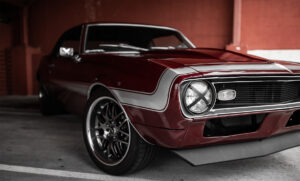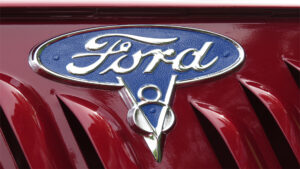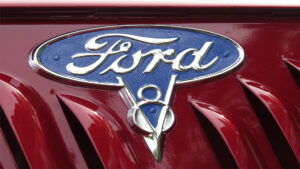MuscleCar Builds
Want more content like this?
Join the PowerNation Email NewsletterParts Used In This Episode
Air-Ride Technologies
Front Strong Arm system with Shockwave tubular upper and lower control arms, lower crosshafts, bushings, ball joints, Shockwave airbags, and all necessary fasteners and bracketry, rear Strong Arm system with tubular upper arm, lower control arms, adjustable panhard bar, Airsprings, shocks and all necessary fasteners and bracketry.
Auto Body Color & Supply Co.
Weldthru II coating, brushable seam sealer.
Sherman and Associates, Inc.
Rear quarter panel lower rear sections.
Strip Masters of Nashville
Blasting of Firebird body shell.
YearOne
RH floor brace, LH and RH full floor pan, RH trunk floor, LH floor brace, RH floor brace, trunk floor center section, RH floor box brace, LH floor box brace, RH outer trunk extension floor panel, LH and RH toe board, shift tunnel plate seal, shift tunnel plate, trunk floor brace, fuel tank brace, upper rear seat floor brace, upper trunk floor, upper trunk floor brace, LH outer trunk floor extension panel, RH under seat floor brace, LH under seat floor brace, LH under seat pan, RH under seat brac
Episode Transcript
Today on muscle car got rust. Oh, that's freaking lovely. We're gonna show you how to get it out of there. The tribute Trans Ams dirty secrets are revealed and move over the king of the road rains again.
Hey guys, welcome to the shop. I'm getting ready to pull the front sub frame back off our 69 firebird and get the body sent off to the blaster. Now, the impala was calling Brent's name. So while I keep rolling on the year one tribute trans Am, Brent's gonna get the tubs finished up in the back end of Red Sled.
Last time we got the firebird torn apart
and mocked up the Ls Seven and tranny
and made some modifications to the cross members.
Now,
normally you'd mock up the rest of the drive train before you pull the Subra off, but her rear end hasn't shown up yet and I'm getting a little impatient, so we're moving on and that means the motor training's gotta come out
since Brent so absorbed in the impala. Chris came down from extreme to help out. Hey, Rick, I heard you. I don't know how to pull a motor.
Yeah, I need a little help on this thing. I'm a painter, man. I got an engine puller.
We could put some wheels back on and roll the Subra out with the drive train in one piece. But since we're putting a different transmission in, it'll be easier to separate it now.
All right. Pull it up a little bit. All right,
you got it from here, man. That's good. Yeah,
that's cool
for the
time to drop the floor pans out. Why are they coming out before it gets blasted? Well, whoever put these replacement pans in covered up the old ones. So by taking these out, we'll be exposing the metal that needs to get blasted.
I was hoping they'd unscrew and come right out. Yeah. No such luck. There's a lot of brazen in here, so I'm gonna have to chisel them out.
See, now, this is exactly what I was talking about now that this rust is uncovered. It can get the blasting it deserves.
Now that all the hidden rust is out in the open. It's on its way to strip masters of Nashville to be blasted
time to turn our attention back to the impala.
Old red sled has come a long way
to tearing it apart. We braced up the frame
mocked up. The air ride suspension
had a powder coated
fit the body put in new floor pans and got started on the tub. Now that the tubs are in the bracing behind the back seats can go back in place.
Since the tubs added an extra inch on each side, the braces in the corners will have to be replaced. So Brent's going to make some new ones.
Now, we could use our shrink or stretcher to make this piece, but you don't need a shop full of tools to do this. Some relief cuts and careful bending will also work
one last detail before the seat pans go in. They need an edge to attach to it.
No problem. A couple of simple pieces welded in place and the pans can go in.
Cool. Brett looks like you're almost ready for the pans. Huh? Uh
Not quite.
We're gonna have to
chop them up a bit
a little bit. We
added that inch.
We're gonna have to take it out this right here.
I got you
much cutting to be done.
Cool.
We will hack it
if we want these to fit, right. I need to keep this molded edge. So I'm trimming it off.
Removing the part we don't need,
then Brent's reattaching it in its new position.
Now, once all the mountain holes are drilled and it's punched out for spot welds, it's ready to become a permanent part of red sled.
Hey, man, how's it going?
It's looking pretty good.
So,
oh, I wish this side was looking that good. I still got some trimming up here, so I gotta fit that.
So I got a little bit of work to do.
All right,
see you in a bit.
See you
right now. Part of the problem with this panel is that we got too much material over here and it's not letting this thing drop in, which is leaving a gap over here in this edge. So the first thing I gotta do is come through and get that out of my way.
One more test fit.
Way
more, better
looks good so I can prep it and drop it in.
All right, this has got to come up. So I just
need to jack hold it.
Now. Sometimes the best tits are low tech
and here's some garage engineering at its finest.
Hey, you guys know what I mean? If you use what you got,
I finally got a rear seat pan here trimmed out and fitting pretty good so I can get it welded in. After that, we can put in our tunnel that was designed to clear our frame bracing, then we can move on to patching in our quarters
after the break. Rick and Brent wage a battle against red sleds rust.
Now, Brent's got that rear seat kind of welding in place and looking great. And as long as he's on a roll with the sheet metal, he's gonna keep going on these quarter panels. Meanwhile, there's a lot of other panels that need my attention. So I'm gonna get started on the fenders.
This one has rust exactly where you'd expect it.
Down in the lower corner behind the wheel. Well, so that's the only area that I'll need to cut out.
Now, if you notice here when I slash my fender, I knock our bottom liner out of alignment. That's because it's sitting on a rack to correct that. I'm gonna use a piece of copper wire. You can actually pull the bottom of this fender in and bring that back into alignment.
Once you start cutting on these panels, you're probably gonna uncover more problems.
Hey, but that's what rust repair is all about. Oh, that's freaking lovely.
Yeah, but Brent's got his own rust issues to deal with on the quarter panel. After marking the area that needs to be patched, he takes a cut off wheel to it.
Look, here's part of the window.
It's like going to the beach inside this car.
Whenever you can see rust on the outside,
there's always going to be much more behind it. If you want a good solid patch, got to replace the inner pieces as well.
Cutting a larger piece than he's actually going to need from the patch panel. That way, it'll be easier to handle.
The front of the wheel wells are being re radius to make room for those bad A 22 S. So a little modification is going to be in order
with that done, you can cut the patch down to size and weld it in.
Is it freaking awesome or what
watch out this thing, a slide right up in there. Like so
he was ready to start doing some welding sunk.
Word
glorious.
Now, sometimes when the
Clios don't pull it in tight enough, you can attach a stud to pull the sheet metal out to where you need it.
Now, this marks a milestone in the progression of red sled. The first glob of plastic filler. Now, all the work that Brent's doing over there is gonna require the same thing. And believe me, there's a lot more metal work that still needs to be done.
And that means that this is just the beginning of a long muddy journey.
The first application of filler is the most important. Think of it as a foundation. If it's not right. Nothing you put on top of it will be right. Either ad a sander can be your best friend or your worst enemy, depending on your skill. If you're a rookie, a block and guide code is a better bet. And here's one of those things that's so obvious that a lot of guys don't really think about it.
When you're mixing your Bondo,
you sure you spread it out and work all those air bubbles out of there. Otherwise they'll come back and bite you in the butt.
If you worked your sheet metal correctly, you shouldn't take more than a couple of coats.
And once I knock it down with AD A, I'll smooth it out with a coat of finishing putty in a block.
We got one panel down and plenty more to go. And no one ever said that this was a fast or an easy process, but we want red sled to look perfect and there is no shortcut to perfection,
but all this hard work is gonna pay off the day. She comes rolling out of that booth looking straighter than the day she was built. Now stick around because we're gonna check out and see what's left of our firebird when it gets back from the blast.
Coming up on flashback. A Shelby Cobra that ruled the roads in 68.
Today's flashback, a 1968 Shelby Cobra Kr
roll out the red carpet muscle car fans today the King is coming to town.
No, I'm not talking about Elvis. I am talking about the king of the road
in 1968. The infamous Shelby Cobra Kr was made in limited numbers.
Now, only about 1200 Krs were made for production and less than 1000 were fastbacks like this one owned by Mike Acre.
The styling of the 68 Kr had stayed pretty true to the design from earlier years
and the fiberglass nose was reshaped in 68 for a more aggressive look.
Shelby was anything but modest about plastering his name all over his masterpiece,
but the good looks aren't what got this car titled King of the Road.
The 428 Cobra Jet that pushes this snake down the road, might have something to do with it.
Now, officially Shelby claimed the king only had 335 horses kicking around in those massive eight cylinders.
But guys in the know
anyone else has ever pushed the loud pedal in one of these things.
Will they know that 335 is nothing but a low ball number
just to keep insurance affordable.
A pair of power front disc brakes and oversized drums in the back along with 16 to 1 power steering ratio. Keep the cavalry all under control.
The
C six transmission reinforced shock towers and staggered rear shocks may have helped with the name as well.
Now, rumor has it that the name king of the road blow a swipe from GM
you Chevy guys, you can talk all you want stolen name or not.
This car's got to set
the 15 inch wheels that keep the king reigning over his domain.
If you had one of these parked in your garage in 68 he also had about 4500 bucks missing out of your bank account
worth every penny. These cars were packed full of options. Sequential blinkers out back were touched off with chrome trimming bumpers and the dual exhaust. Will it let everyone know the arrival of this nobility
up front. A classic Shelby front end with four big lamps and a massive scoop to keep the big black cobra jet cool.
The
rams air down the throat of a hungry 735 CFM hall
and the stripes,
they just look cool.
Now, these cars were meant to race and inside. Well, safety was a key component
to nurse. A real shoulder harness and seat belts, hold the driver and passenger securely in place while the roll bar runs overhead, you know, just in case the style wasn't too far behind safety.
The
de
vinyl interior complete with bucket seats was set off with a walnut grained instrument panel and door panels.
A full set of gauges included an 8000 rev tack and a Speedo capable of reading 140 miles an hour or constant temptation for a heavy right
foot.
Ok. Now, whether Shelby swiped the name king of the road from GM or not,
but this cover rightfully is the title
Big Ford Power coupled with Shelby racing style and engineering commands respect from any would be Challenger
stick around because we got more muscle car after the break.
Hey, welcome back. I've been doing the body work on these panels and I got the fenders and the doors done next up is this hood here and I got a little tip for you since we sand blasted. They took all the seam sealer out of the back and that means that there's no support for the face of this thing to solve that problem. We need to replace the seam sealer on the back before we can attack the body work on the front.
Now, this is sea ser,
but I've even used windshield urethane. The tape's here to give it a clean edge. I'm not sealing this completely because moisture could get trapped inside and cause rust. So I'm leaving some gaps to allow water to escape.
Meanwhile, Brent's making progress on the quarter panels, cutting out the old and patching in the new
full quarters just aren't available for 61 and Paula.
But patch panels are
year one set us up with the front pieces and Sherman associates with these rear panels.
But the rust we're dealing with extended further into the wheel wells than the patch panels were designed for. So Brent sat in a strip to fill it in.
Well, we got a bird back from the blaster and strip masters did a fantastic job of cleaning this thing up. Unfortunately, they've uncovered a whole lot of problems with this body. So at this point, we need to back up a little bit, do an inspection and try to come up with a game plan.
That's what we got going here, man.
It's like a whole lot of rust. Me.
I'd say you're right. A lot of stuff they don't even make, I don't think they make door jams for these. Do they
be pull
up?
Sink? Is, dude, looks like someone shot it.
The tail panel is not gonna be a fixable dude. That's a mess right there. It looks like someone wadded it up, stuck on a rock and beat it back out with a stick. You know, dude, I'm amazed at how good this thing looked with paint on it
and how bad it looks without it. This be
piler is gone too.
Uh,
we need another, one of those beat pillows that they don't make.
That
the bracing on the inside is even rusted out.
Oh, that's nice too. You can see daylight through the firewall,
top of this dash is gone
and I never thought I'd say it.
The impala looks cherry compared to this thing. We're gonna have to fall back and regroup and figure out what the heck we're gonna do with this. This is, this is a mess, man.
I would agree.
After closer inspection, it's pretty obvious that for most guys, this car is just too far gone. Now, we could save it. But the man hours that would be involved in doing that would mean that we have to push all of our other cool projects off the table for the rest of the season.
Now, for the guys at year one, this car has some sentimental value and because of that, they really want to have some involvement in the build. So they're gonna take it off our hands and give us a little jump start on the sheet metal work and that means that we get to move on to our next project. But for now we're out of here.
Show Full Transcript
Hey guys, welcome to the shop. I'm getting ready to pull the front sub frame back off our 69 firebird and get the body sent off to the blaster. Now, the impala was calling Brent's name. So while I keep rolling on the year one tribute trans Am, Brent's gonna get the tubs finished up in the back end of Red Sled.
Last time we got the firebird torn apart
and mocked up the Ls Seven and tranny
and made some modifications to the cross members.
Now,
normally you'd mock up the rest of the drive train before you pull the Subra off, but her rear end hasn't shown up yet and I'm getting a little impatient, so we're moving on and that means the motor training's gotta come out
since Brent so absorbed in the impala. Chris came down from extreme to help out. Hey, Rick, I heard you. I don't know how to pull a motor.
Yeah, I need a little help on this thing. I'm a painter, man. I got an engine puller.
We could put some wheels back on and roll the Subra out with the drive train in one piece. But since we're putting a different transmission in, it'll be easier to separate it now.
All right. Pull it up a little bit. All right,
you got it from here, man. That's good. Yeah,
that's cool
for the
time to drop the floor pans out. Why are they coming out before it gets blasted? Well, whoever put these replacement pans in covered up the old ones. So by taking these out, we'll be exposing the metal that needs to get blasted.
I was hoping they'd unscrew and come right out. Yeah. No such luck. There's a lot of brazen in here, so I'm gonna have to chisel them out.
See, now, this is exactly what I was talking about now that this rust is uncovered. It can get the blasting it deserves.
Now that all the hidden rust is out in the open. It's on its way to strip masters of Nashville to be blasted
time to turn our attention back to the impala.
Old red sled has come a long way
to tearing it apart. We braced up the frame
mocked up. The air ride suspension
had a powder coated
fit the body put in new floor pans and got started on the tub. Now that the tubs are in the bracing behind the back seats can go back in place.
Since the tubs added an extra inch on each side, the braces in the corners will have to be replaced. So Brent's going to make some new ones.
Now, we could use our shrink or stretcher to make this piece, but you don't need a shop full of tools to do this. Some relief cuts and careful bending will also work
one last detail before the seat pans go in. They need an edge to attach to it.
No problem. A couple of simple pieces welded in place and the pans can go in.
Cool. Brett looks like you're almost ready for the pans. Huh? Uh
Not quite.
We're gonna have to
chop them up a bit
a little bit. We
added that inch.
We're gonna have to take it out this right here.
I got you
much cutting to be done.
Cool.
We will hack it
if we want these to fit, right. I need to keep this molded edge. So I'm trimming it off.
Removing the part we don't need,
then Brent's reattaching it in its new position.
Now, once all the mountain holes are drilled and it's punched out for spot welds, it's ready to become a permanent part of red sled.
Hey, man, how's it going?
It's looking pretty good.
So,
oh, I wish this side was looking that good. I still got some trimming up here, so I gotta fit that.
So I got a little bit of work to do.
All right,
see you in a bit.
See you
right now. Part of the problem with this panel is that we got too much material over here and it's not letting this thing drop in, which is leaving a gap over here in this edge. So the first thing I gotta do is come through and get that out of my way.
One more test fit.
Way
more, better
looks good so I can prep it and drop it in.
All right, this has got to come up. So I just
need to jack hold it.
Now. Sometimes the best tits are low tech
and here's some garage engineering at its finest.
Hey, you guys know what I mean? If you use what you got,
I finally got a rear seat pan here trimmed out and fitting pretty good so I can get it welded in. After that, we can put in our tunnel that was designed to clear our frame bracing, then we can move on to patching in our quarters
after the break. Rick and Brent wage a battle against red sleds rust.
Now, Brent's got that rear seat kind of welding in place and looking great. And as long as he's on a roll with the sheet metal, he's gonna keep going on these quarter panels. Meanwhile, there's a lot of other panels that need my attention. So I'm gonna get started on the fenders.
This one has rust exactly where you'd expect it.
Down in the lower corner behind the wheel. Well, so that's the only area that I'll need to cut out.
Now, if you notice here when I slash my fender, I knock our bottom liner out of alignment. That's because it's sitting on a rack to correct that. I'm gonna use a piece of copper wire. You can actually pull the bottom of this fender in and bring that back into alignment.
Once you start cutting on these panels, you're probably gonna uncover more problems.
Hey, but that's what rust repair is all about. Oh, that's freaking lovely.
Yeah, but Brent's got his own rust issues to deal with on the quarter panel. After marking the area that needs to be patched, he takes a cut off wheel to it.
Look, here's part of the window.
It's like going to the beach inside this car.
Whenever you can see rust on the outside,
there's always going to be much more behind it. If you want a good solid patch, got to replace the inner pieces as well.
Cutting a larger piece than he's actually going to need from the patch panel. That way, it'll be easier to handle.
The front of the wheel wells are being re radius to make room for those bad A 22 S. So a little modification is going to be in order
with that done, you can cut the patch down to size and weld it in.
Is it freaking awesome or what
watch out this thing, a slide right up in there. Like so
he was ready to start doing some welding sunk.
Word
glorious.
Now, sometimes when the
Clios don't pull it in tight enough, you can attach a stud to pull the sheet metal out to where you need it.
Now, this marks a milestone in the progression of red sled. The first glob of plastic filler. Now, all the work that Brent's doing over there is gonna require the same thing. And believe me, there's a lot more metal work that still needs to be done.
And that means that this is just the beginning of a long muddy journey.
The first application of filler is the most important. Think of it as a foundation. If it's not right. Nothing you put on top of it will be right. Either ad a sander can be your best friend or your worst enemy, depending on your skill. If you're a rookie, a block and guide code is a better bet. And here's one of those things that's so obvious that a lot of guys don't really think about it.
When you're mixing your Bondo,
you sure you spread it out and work all those air bubbles out of there. Otherwise they'll come back and bite you in the butt.
If you worked your sheet metal correctly, you shouldn't take more than a couple of coats.
And once I knock it down with AD A, I'll smooth it out with a coat of finishing putty in a block.
We got one panel down and plenty more to go. And no one ever said that this was a fast or an easy process, but we want red sled to look perfect and there is no shortcut to perfection,
but all this hard work is gonna pay off the day. She comes rolling out of that booth looking straighter than the day she was built. Now stick around because we're gonna check out and see what's left of our firebird when it gets back from the blast.
Coming up on flashback. A Shelby Cobra that ruled the roads in 68.
Today's flashback, a 1968 Shelby Cobra Kr
roll out the red carpet muscle car fans today the King is coming to town.
No, I'm not talking about Elvis. I am talking about the king of the road
in 1968. The infamous Shelby Cobra Kr was made in limited numbers.
Now, only about 1200 Krs were made for production and less than 1000 were fastbacks like this one owned by Mike Acre.
The styling of the 68 Kr had stayed pretty true to the design from earlier years
and the fiberglass nose was reshaped in 68 for a more aggressive look.
Shelby was anything but modest about plastering his name all over his masterpiece,
but the good looks aren't what got this car titled King of the Road.
The 428 Cobra Jet that pushes this snake down the road, might have something to do with it.
Now, officially Shelby claimed the king only had 335 horses kicking around in those massive eight cylinders.
But guys in the know
anyone else has ever pushed the loud pedal in one of these things.
Will they know that 335 is nothing but a low ball number
just to keep insurance affordable.
A pair of power front disc brakes and oversized drums in the back along with 16 to 1 power steering ratio. Keep the cavalry all under control.
The
C six transmission reinforced shock towers and staggered rear shocks may have helped with the name as well.
Now, rumor has it that the name king of the road blow a swipe from GM
you Chevy guys, you can talk all you want stolen name or not.
This car's got to set
the 15 inch wheels that keep the king reigning over his domain.
If you had one of these parked in your garage in 68 he also had about 4500 bucks missing out of your bank account
worth every penny. These cars were packed full of options. Sequential blinkers out back were touched off with chrome trimming bumpers and the dual exhaust. Will it let everyone know the arrival of this nobility
up front. A classic Shelby front end with four big lamps and a massive scoop to keep the big black cobra jet cool.
The
rams air down the throat of a hungry 735 CFM hall
and the stripes,
they just look cool.
Now, these cars were meant to race and inside. Well, safety was a key component
to nurse. A real shoulder harness and seat belts, hold the driver and passenger securely in place while the roll bar runs overhead, you know, just in case the style wasn't too far behind safety.
The
de
vinyl interior complete with bucket seats was set off with a walnut grained instrument panel and door panels.
A full set of gauges included an 8000 rev tack and a Speedo capable of reading 140 miles an hour or constant temptation for a heavy right
foot.
Ok. Now, whether Shelby swiped the name king of the road from GM or not,
but this cover rightfully is the title
Big Ford Power coupled with Shelby racing style and engineering commands respect from any would be Challenger
stick around because we got more muscle car after the break.
Hey, welcome back. I've been doing the body work on these panels and I got the fenders and the doors done next up is this hood here and I got a little tip for you since we sand blasted. They took all the seam sealer out of the back and that means that there's no support for the face of this thing to solve that problem. We need to replace the seam sealer on the back before we can attack the body work on the front.
Now, this is sea ser,
but I've even used windshield urethane. The tape's here to give it a clean edge. I'm not sealing this completely because moisture could get trapped inside and cause rust. So I'm leaving some gaps to allow water to escape.
Meanwhile, Brent's making progress on the quarter panels, cutting out the old and patching in the new
full quarters just aren't available for 61 and Paula.
But patch panels are
year one set us up with the front pieces and Sherman associates with these rear panels.
But the rust we're dealing with extended further into the wheel wells than the patch panels were designed for. So Brent sat in a strip to fill it in.
Well, we got a bird back from the blaster and strip masters did a fantastic job of cleaning this thing up. Unfortunately, they've uncovered a whole lot of problems with this body. So at this point, we need to back up a little bit, do an inspection and try to come up with a game plan.
That's what we got going here, man.
It's like a whole lot of rust. Me.
I'd say you're right. A lot of stuff they don't even make, I don't think they make door jams for these. Do they
be pull
up?
Sink? Is, dude, looks like someone shot it.
The tail panel is not gonna be a fixable dude. That's a mess right there. It looks like someone wadded it up, stuck on a rock and beat it back out with a stick. You know, dude, I'm amazed at how good this thing looked with paint on it
and how bad it looks without it. This be
piler is gone too.
Uh,
we need another, one of those beat pillows that they don't make.
That
the bracing on the inside is even rusted out.
Oh, that's nice too. You can see daylight through the firewall,
top of this dash is gone
and I never thought I'd say it.
The impala looks cherry compared to this thing. We're gonna have to fall back and regroup and figure out what the heck we're gonna do with this. This is, this is a mess, man.
I would agree.
After closer inspection, it's pretty obvious that for most guys, this car is just too far gone. Now, we could save it. But the man hours that would be involved in doing that would mean that we have to push all of our other cool projects off the table for the rest of the season.
Now, for the guys at year one, this car has some sentimental value and because of that, they really want to have some involvement in the build. So they're gonna take it off our hands and give us a little jump start on the sheet metal work and that means that we get to move on to our next project. But for now we're out of here.
